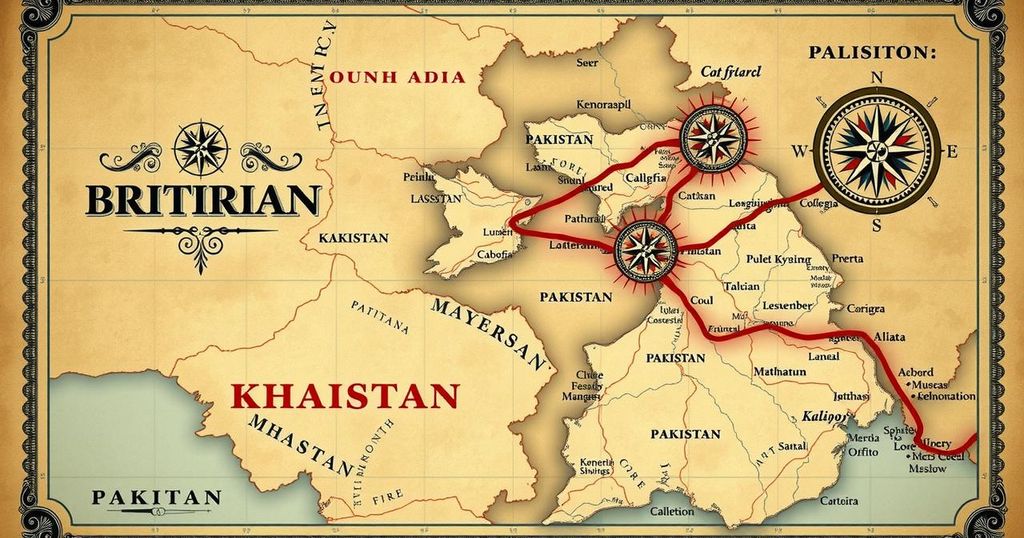The article discusses Britain’s historical ties with anti-India groups, particularly Khalistani extremists, exposing its failure to address radical activities on its soil. The author argues that Britain’s colonial past affects its relations with India, urging India to halt trade negotiations and implement reciprocal policies. The enduring legacy of colonialism presents ongoing diplomatic challenges between the two nations.
The recent breach of security involving India’s External Affairs Minister, S. Jaishankar, by Khalistani extremists, has highlighted a troubling truth: the UK has become a refuge for anti-India factions. London has not effectively curbed the activities of radical groups that target India’s sovereignty, standing alongside Canada’s lackluster efforts. The ongoing situation reflects Britain’s inability to reconcile with its colonial past, particularly its loss of India in 1947, which dismantled its once considerable empire.
The decline of Britain, dubbed by U.S. Vice President JD Vance as a shift from an “empire without sunset” to a mere “random nation,” speaks to the legacy of imperialism that still influences its policies. The mindset of former grandeur appears in Britain’s foreign affairs, particularly regarding its vested interests in Pakistan. Historically, British leaders, including Winston Churchill, played significant roles in creating Pakistan, reflecting a longstanding partiality towards Islamabad.
As notable historian Narendra Singh Sarila indicates in his book, The Shadow of the Great Game, the British establishment feared Soviet expansion in the 1940s and thus supported Jinnah’s Pakistan. This nurtured a persistent bias favoring Pakistan within British political circles, especially against India, a sentiment that remains evident today.
Britain’s proximity to Khalistani proponents is notable, as political leaders across various parties display sympathies towards their cause. For instance, Preet Kaur Gill, a British MP, participated in a Khalistani event despite being part of a Cabinet negotiating a Free Trade Agreement with India. Her previous statements declaring support for Sikh self-determination underscore this troubling relationship.
The culmination of this relationship has manifested in violent actions by Khalistanis in the UK, including attacks on the Indian High Commission and interruptions during diplomatic visits. This lack of action from British authorities under the guise of free expression invites concern about their commitment to maintaining diplomatic decorum.
Historically, Britain’s ties with Khalistani movements trace back to early 20th-century efforts to suppress anti-British sentiment within the Indian diaspora. British intelligence, in its effort to undermine nationalist elements within the Sikh community, laid the groundwork for current tensions.
India should consider strategic measures in response to these circumstances. First, India ought to suspend trade negotiations with the UK, exerting pressure on Britain to reconsider its stance. Furthermore, adopting a policy of reciprocity in diplomatic relations would assert India’s expectations that the UK aligns its treatment of Indian citizens with British practices.
The current climate suggests Britain has enjoyed unbalanced diplomatic relations with India for too long. It is imperative that Britain recognize its current position, distancing itself from its colonial past, and discontinue its support for factions that threaten India. Otherwise, the UK will face consequences for clinging to outdated colonial affiliations devoid of relevance to contemporary geopolitics.
In summary, Britain’s historical and ongoing affiliations with anti-India groups, particularly Khalistani extremists, have raised significant concerns regarding its commitment to fostering constructive international relations. India is urged to reassess its diplomatic stance, asserting the necessity for reciprocal treatment and accountability. This situation reflects an enduring colonial mindset that Britain must relinquish to advance mutually respectful relations with India.
Original Source: www.firstpost.com






